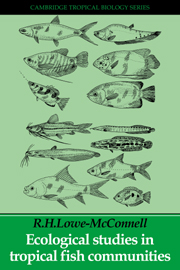Summary
Tropical communities of both plants and animals are characteristically diverse, with large numbers of species and very complex interrelationships compared with those in temperate zone communities. Fish faunas obey this general ecological rule, within both families and environments.
Fishes are the most ancient and numerous of vertebrates. Over 20 000 species are known, the majority of which live in the warm waters of the world. About 8000 species (40%) live on the continental shelves of warm seas in water less than 200 m deep, compared with only about 1130 species (5%) in similar habitats in cold seas. Freshwaters carry a surprisingly high total, about 8500 species (over 40%), the majority in the vast river systems and lakes of the tropics (Cohen, 1970). The Amazon system has over 1300 species, the Zaire (Congo) in Africa nearly 700, compared with but 250 species in the Mississippi system in North America and 192 in the whole of Europe. Each of the Great Lakes Victoria, Tanganyika and Malawi in eastern Africa has over 200 species, most of them endemic, i.e. found only in the particular lake. Of the 445 families offish, the seven largest (which include ca 30% of the total) – Cyprinidae, Gobiidae, Characidae, Cichlidae, Labridae, Loricariidae and Serranidae – are all well represented in tropical waters (Nelson, 1984).
- Type
- Chapter
- Information
- Ecological Studies in Tropical Fish Communities , pp. 3 - 24Publisher: Cambridge University PressPrint publication year: 1987



